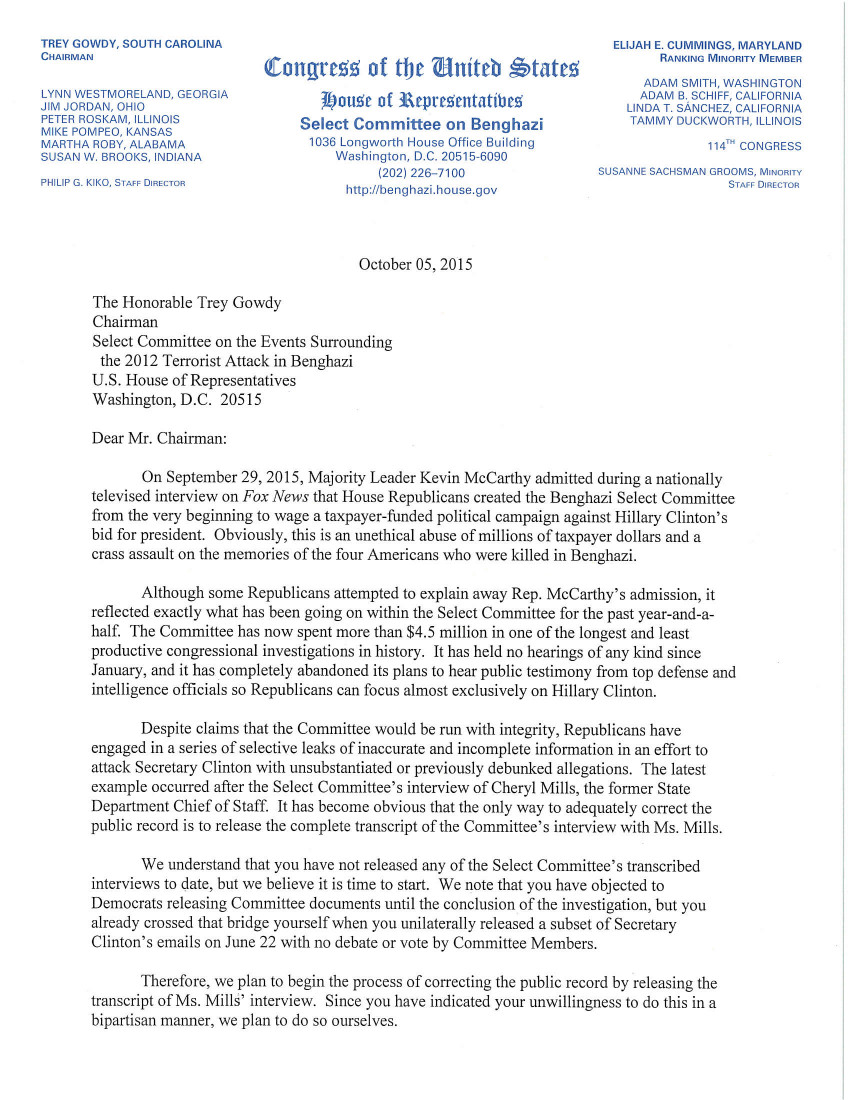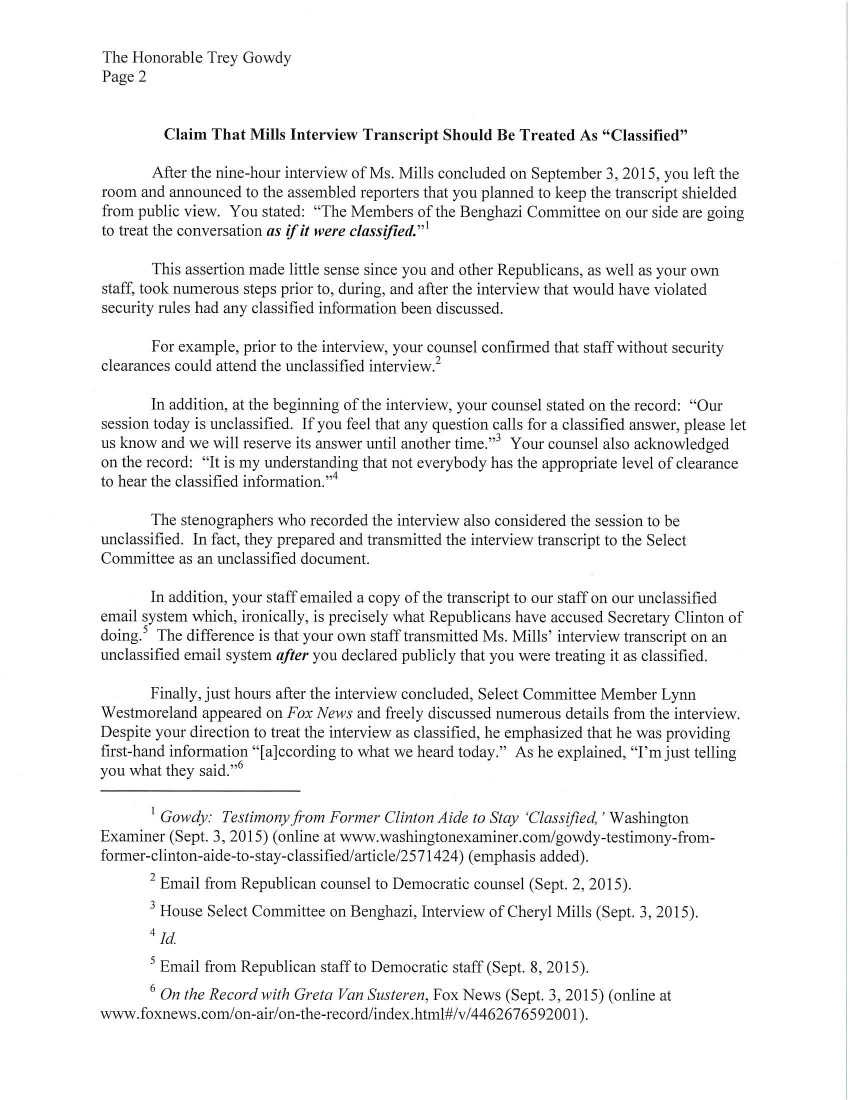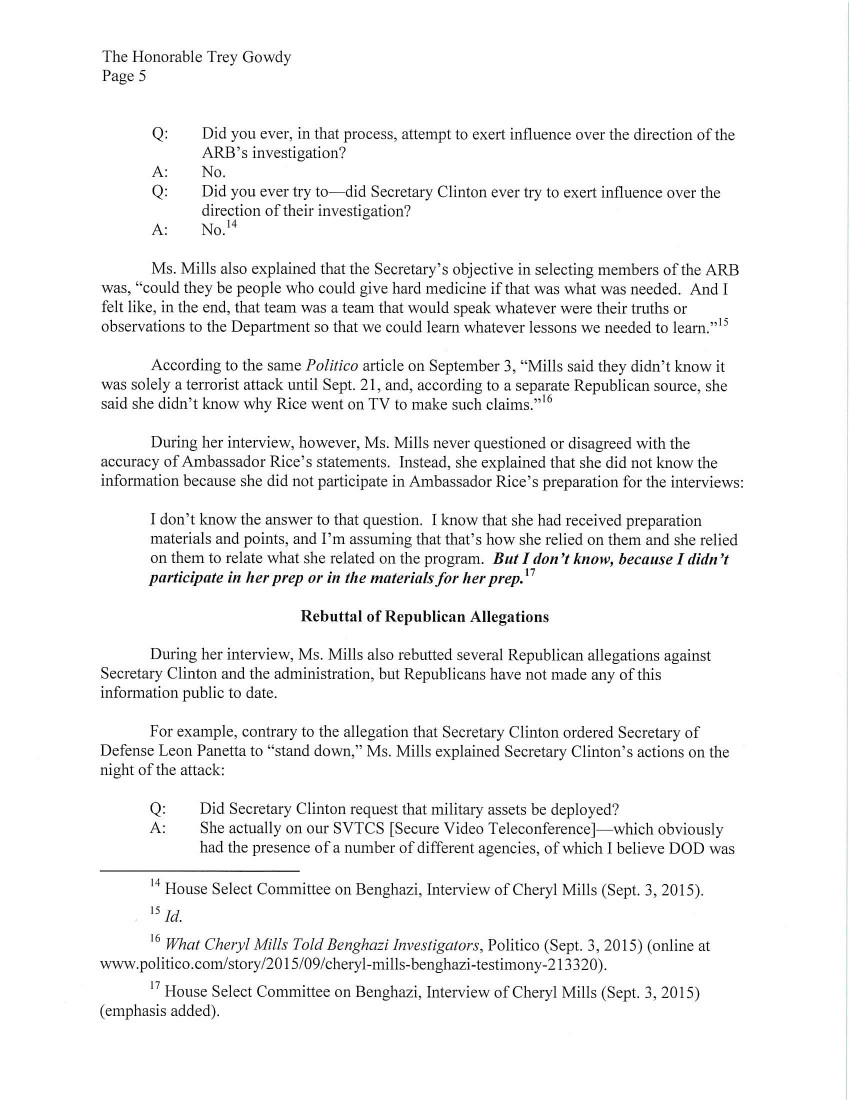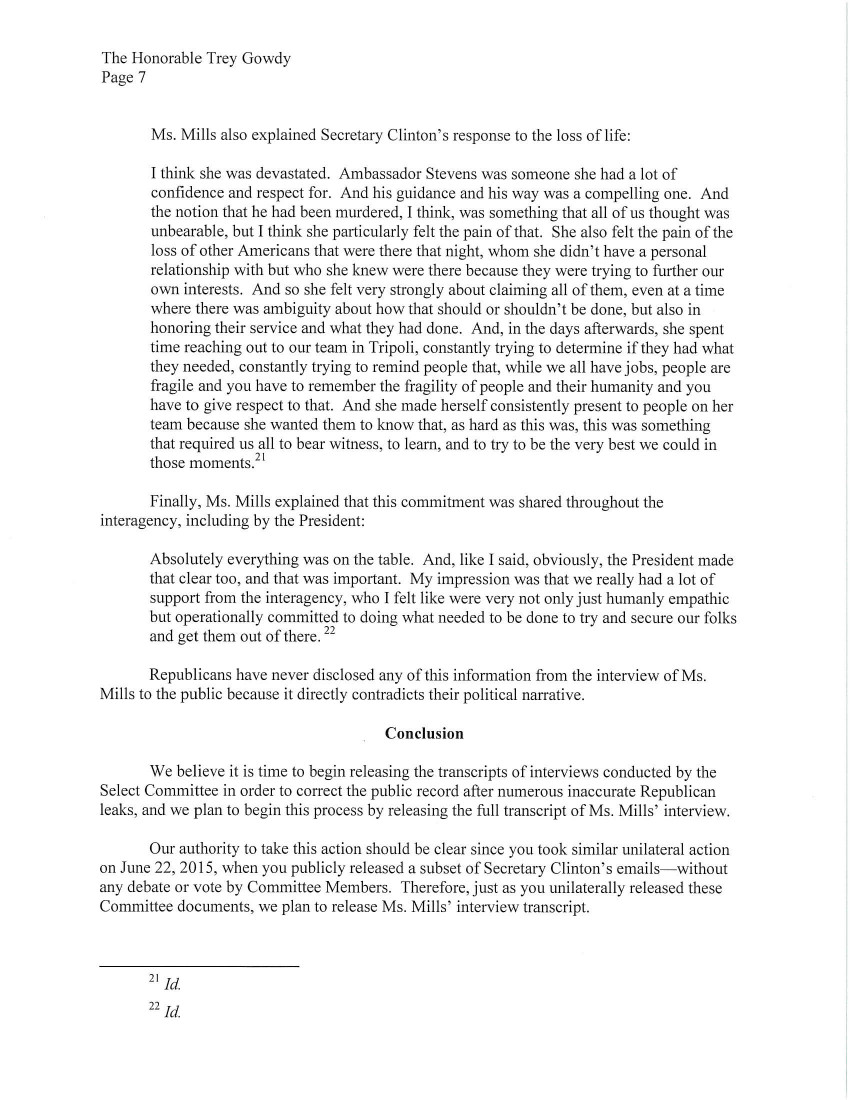







Here is the press release followed by a print version of the letter,
Democrats to Release Mills Interview Transcript to Correct Public Record
Oct 5, 2015Press Release“We Will No Longer Sit and Watch Selective, Out-of-Context Leaks Continue to Mischaracterize the Testimony the Select Committee Has Received”WASHINGTON—Today, all five Democratic Members of the Select Committee on Benghazi sent a letter informing Chairman Trey Gowdy that they plan to begin releasing witness interview transcripts, starting with the interview of former State Department Chief of Staff Cheryl Mills, in order to correct the public record after numerous inaccurate Republican leaks.
“Despite claims that the Committee would be run with integrity, Republicans have engaged in a series of selective leaks of inaccurate and incomplete information in an effort to attack Secretary Clinton with unsubstantiated or previously debunked allegations,” the Democrats wrote.
“The latest example occurred after the Select Committee’s interview of Cheryl Mills, the former State Department Chief of Staff. It has become obvious that the only way to adequately correct the public record is to release the complete transcript of the Committee’s interview with Ms. Mills,” the Democrats wrote.
Democrats point to the Republican leaks as further evidence of Majority Leader Kevin McCarthy’s stark admission that House Republicans created the Benghazi Committee to wage a taxpayer-funded political attack against Secretary Clinton’s bid for president.
The Democrats’ letter released several excerpts from Ms. Mills’ interview that rebut Republican allegations against Secretary Clinton and the administration, but were never made public by Republicans.
Before releasing the full transcript, Democrats are giving Gowdy five days to identify any specific information in the transcript he believes should “be withheld from the American people.”
“We understand that you have not released any of the Select Committee’s transcribed interviews to date, but we believe it is time to start. We note that you have objected to Democrats releasing Committee documents until the conclusion of the investigation, but you already crossed that bridge yourself when you unilaterally released a subset of Secretary Clinton’s emails on June 22 with no debate or vote by Committee Members,” the Democrats wrote.
“Therefore, we plan to begin the process of correcting the public record by releasing the transcript of Ms. Mills’ interview. Since you have indicated your unwillingness to do this in a bipartisan manner, we plan to do so ourselves.”
Read the full letter set forth below or online here:
October 05, 2015
The Honorable Trey Gowdy
Chairman
Select Committee on the Events Surrounding
the 2012 Terrorist Attack in Benghazi
U.S. House of Representatives
Washington, D.C. 20515
Dear Mr. Chairman:
On September 29, 2015, Majority Leader Kevin McCarthy admitted during a nationally televised interview on Fox News that House Republicans created the Benghazi Select Committee from the very beginning to wage a taxpayer-funded political campaign against Hillary Clinton’s bid for president. Obviously, this is an unethical abuse of millions of taxpayer dollars and a crass assault on the memories of the four Americans who were killed in Benghazi.
Although some Republicans attempted to explain away Rep. McCarthy’s admission, it reflected exactly what has been going on within the Select Committee for the past year-and-a-half. The Committee has now spent more than $4.5 million in one of the longest and least productive congressional investigations in history. It has held no hearings of any kind since January, and it has completely abandoned its plans to hear public testimony from top defense and intelligence officials so Republicans can focus almost exclusively on Hillary Clinton.
Despite claims that the Committee would be run with integrity, Republicans have engaged in a series of selective leaks of inaccurate and incomplete information in an effort to attack Secretary Clinton with unsubstantiated or previously debunked allegations. The latest example occurred after the Select Committee’s interview of Cheryl Mills, the former State Department Chief of Staff. It has become obvious that the only way to adequately correct the public record is to release the complete transcript of the Committee’s interview with Ms. Mills.
We understand that you have not released any of the Select Committee’s transcribed interviews to date, but we believe it is time to start. We note that you have objected to Democrats releasing Committee documents until the conclusion of the investigation, but you already crossed that bridge yourself when you unilaterally released a subset of Secretary Clinton’s emails on June 22 with no debate or vote by Committee Members.
Therefore, we plan to begin the process of correcting the public record by releasing the transcript of Ms. Mills’ interview. Since you have indicated your unwillingness to do this in a bipartisan manner, we plan to do so ourselves.
Claim That Mills Interview Transcript Should Be Treated As “Classified”
After the nine-hour interview of Ms. Mills concluded on September 3, 2015, you left the room and announced to the assembled reporters that you planned to keep the transcript shielded from public view. You stated: “The Members of the Benghazi Committee on our side are going to treat the conversation as if it were classified.”
This assertion made little sense since you and other Republicans, as well as your own staff, took numerous steps prior to, during, and after the interview that would have violated security rules had any classified information been discussed.
For example, prior to the interview, your counsel confirmed that staff without security clearances could attend the unclassified interview.
In addition, at the beginning of the interview, your counsel stated on the record: “Our session today is unclassified. If you feel that any question calls for a classified answer, please let us know and we will reserve its answer until another time.” Your counsel also acknowledged on the record: “It is my understanding that not everybody has the appropriate level of clearance to hear the classified information.”
The stenographers who recorded the interview also considered the session to be unclassified. In fact, they prepared and transmitted the interview transcript to the Select Committee as an unclassified document.
In addition, your staff emailed a copy of the transcript to our staff on our unclassified email system which, ironically, is precisely what Republicans have accused Secretary Clinton of doing. The difference is that your own staff transmitted Ms. Mills’ interview transcript on an unclassified email system after you declared publicly that you were treating it as classified.
Finally, just hours after the interview concluded, Select Committee Member Lynn Westmoreland appeared on Fox News and freely discussed numerous details from the interview. Despite your direction to treat the interview as classified, he emphasized that he was providing first-hand information “[a]ccording to what we heard today.” As he explained, “I’m just telling you what they said.”
During Ms. Mills’ interview, she conducted herself professionally, she answered every question posed to her, and she debunked numerous Republican conspiracy theories that have been made for several years—and that continue to be repeated even today—yet Republicans did not make any of that information public.
Republicans may have their own partisan political reasons for wanting to keep Ms. Mills’ interview transcript out of the public view, but they may not suddenly claim it is now classified merely to prohibit its release to the American people. According to Executive Order 13526, information may not be classified merely to “prevent embarrassment to a person, organization, or agency”—including embarrassment to the Select Committee.
Inaccurate Republican Leaks
Republicans began leaking inaccurate information about Ms. Mills’ interview within minutes after your public declaration that it should be treated as classified.
Prior to her interview, Ms. Mills’ counsel wrote to request that the interview be held in public in light of the “numerous reports in the press, as well as public comments from members of your Committee regarding Ms. Mills’ upcoming interview.” At the beginning of the interview, Ms. Mills’ counsel renewed her request to make the transcript public, stating, “I would only ask today that at the end of the day, because this is an unclassified hearing, as was just explained to us, that the transcript be released publicly.”
Instead, Republicans began leaking inaccurate information about the interview out of context. For example, Politico published an article on the front page of its website entitled, “What Cheryl Mills Told Benghazi Investigators.” Relying on multiple “GOP” and “Republican” sources, Politico wrote that “one of the biggest surprises” from the interview was that Ms. Mills “had reviewed and made suggestions for changes” to the report of the Accountability Review Board (ARB). According to “a separate, GOP source,” this supposedly new revelation was “raising alarms on the right” and “call[s] into question the ‘independence’” of the report’s conclusions. Select Committee Member Jim Jordan later provided an interview to another media outlet raising these same concerns.
In fact, this claim was already known—and had been debunked—two years earlier during the investigation led by former Oversight Committee Chairman Darrell Issa.
On June 4, 2013, Ambassador Thomas Pickering, the Chairman of the ARB who served with distinction under both Republican and Democratic Administrations, testified before the Oversight Committee in a sworn deposition. In the transcript made public two years ago, he explained that the ARB provided a draft of the report to the Secretary’s office to ensure “the accuracy and the focus of our recommendations” before they were released. He also testified then that while the ARB considered some of Ms. Mills’ thoughts about the report, neither Secretary Clinton nor Ms. Mills tried to influence the outcome of the ARB’s findings in any way and had no editing rights.
A review of the ARB by the State Department Inspector General issued in September 2013 concluded:
ARB members were conscious of the need to protect their impartiality by limiting their contact with senior managers of the Department during the process. Former members unanimously told OIG team that they encountered no attempts to impede, influence, or interfere with their work at any time or on any level.
Instead of being part of a process to interfere with the findings of the ARB, Ms. Mills participated in the same kind of routine process used by the Government Accountability Office, Inspectors General, and other independent investigative entities that provides agencies under review an opportunity to provide comments before reports are publicly released so investigators can make changes they deem appropriate to ensure their accuracy.
During her interview, Ms. Mills corroborated both Ambassador Pickering’s testimony and the Inspector General’s findings:
Q: Did you ever, in that process, attempt to exert influence over the direction of the ARB’s investigation?
A: No.
Q: Did you ever try to—did Secretary Clinton ever try to exert influence over the direction of their investigation?
A: No.
Ms. Mills also explained that the Secretary’s objective in selecting members of the ARB was, “could they be people who could give hard medicine if that was what was needed. And I felt like, in the end, that team was a team that would speak whatever were their truths or observations to the Department so that we could learn whatever lessons we needed to learn.”
According to the same Politico article on September 3, “Mills said they didn’t know it was solely a terrorist attack until Sept. 21, and, according to a separate Republican source, she said she didn’t know why Rice went on TV to make such claims.”
During her interview, however, Ms. Mills never questioned or disagreed with the accuracy of Ambassador Rice’s statements. Instead, she explained that she did not know the information because she did not participate in Ambassador Rice’s preparation for the interviews:
I don’t know the answer to that question. I know that she had received preparation materials and points, and I’m assuming that that’s how she relied on them and she relied on them to relate what she related on the program. But I don’t know, because I didn’t participate in her prep or in the materials for her prep.
Rebuttal of Republican Allegations
During her interview, Ms. Mills also rebutted several Republican allegations against Secretary Clinton and the administration, but Republicans have not made any of this information public to date.
For example, contrary to the allegation that Secretary Clinton ordered Secretary of Defense Leon Panetta to “stand down,” Ms. Mills explained Secretary Clinton’s actions on the night of the attack:
Q: Did Secretary Clinton request that military assets be deployed?
A: She actually on our SVTCS [Secure Video Teleconference]—which obviously had the presence of a number of different agencies, of which I believe DOD was one—said we need to be taking whatever steps we can, to do whatever we can to secure our people. And I can remember that someone from the White House said that the President was 100 percent behind whatever needed to be done and we needed to do whatever needed to be done. And that’s, you know, that’s what he would expect, but it’s also what was said.
Ms. Mills also explained how Secretary Clinton pressed for rapid action in response to the attacks:
She was pretty emphatic about wanting whatever to be done and whatever were assets that could be deployed, if that was both effective and possible to be done. Obviously, it was a challenging environment, given that our compound had been overrun. And so you want to ensure that, as you also are thinking about who else might go in, how they are able to do that effectively. But my observation and impression and, obviously, engagements were around what can be done, what can be sent, and how can that be done best. There was not any notion of not doing that to the fullest amount that was practical, effective, and possible.
Ms. Mills also had the following exchange about Secretary Clinton’s level of engagement on the night of the attacks:
A: She was very concerned. She was also very determined that whatever needed to be done was done. And she was worried. She was worried not only about our team on the ground in Benghazi but worried about our teams that were on the ground in Libya and our teams on the ground in a number of places, given what we had seen unfold in Egypt.
Q: Did she seem uncertain as to how to respond?
A: No. She was very—she was very certain. And, indeed, when we said it was going to be a staff SVTCS, which was our diplomatic way of saying that maybe she shouldn’t be attending, she said, “I’m coming.” And so we tried to make sure the rest of the interagency knew ahead of time that she was going to be on, but we were unsuccessful, so they were surprised when she sat down.
Q: So were you surprised by that?
A: I’m not surprised, because that’s her approach. She’s a person who steps in and leads. She’s someone who, when there is accountability, takes it. So I wasn’t surprised. But I know that it can sometimes be intimidating to other staff that there is a principal present. And what she really was communicating that night is, “I’m here because I want my team safe. I’m not here because I’m here for any other reason than trying to get their safety. And whatever we need to do to do that I want to do.”
Ms. Mills also explained Secretary Clinton’s response to the loss of life:
I think she was devastated. Ambassador Stevens was someone she had a lot of confidence and respect for. And his guidance and his way was a compelling one. And the notion that he had been murdered, I think, was something that all of us thought was unbearable, but I think she particularly felt the pain of that. She also felt the pain of the loss of other Americans that were there that night, whom she didn’t have a personal relationship with but who she knew were there because they were trying to further our own interests. And so she felt very strongly about claiming all of them, even at a time where there was ambiguity about how that should or shouldn’t be done, but also in honoring their service and what they had done. And, in the days afterwards, she spent time reaching out to our team in Tripoli, constantly trying to determine if they had what they needed, constantly trying to remind people that, while we all have jobs, people are fragile and you have to remember the fragility of people and their humanity and you have to give respect to that. And she made herself consistently present to people on her team because she wanted them to know that, as hard as this was, this was something that required us all to bear witness, to learn, and to try to be the very best we could in those moments.
Finally, Ms. Mills explained that this commitment was shared throughout the interagency, including by the President:
Absolutely everything was on the table. And, like I said, obviously, the President made that clear too, and that was important. My impression was that we really had a lot of support from the interagency, who I felt like were very not only just humanly empathic but operationally committed to doing what needed to be done to try and secure our folks and get them out of there.
Republicans have never disclosed any of this information from the interview of Ms. Mills to the public because it directly contradicts their political narrative.
Conclusion
We believe it is time to begin releasing the transcripts of interviews conducted by the Select Committee in order to correct the public record after numerous inaccurate Republican leaks, and we plan to begin this process by releasing the full transcript of Ms. Mills’ interview.
Our authority to take this action should be clear since you took similar unilateral action on June 22, 2015, when you publicly released a subset of Secretary Clinton’s emails—without any debate or vote by Committee Members. Therefore, just as you unilaterally released these Committee documents, we plan to release Ms. Mills’ interview transcript.
We do not take this action lightly. We have held off on taking such action for more than a year, but we will no longer sit and watch selective, out-of-context leaks continue to mischaracterize the testimony the Select Committee has received.
Please notify us within five days if you believe any information in the full transcript should be withheld from the American people. We are providing the State Department and Ms. Mills’ attorneys with this same opportunity.
Sincerely,
Rep. Elijah E. Cumming Rep. Adam Smith Rep. Adam B. SchiffRep. Linda T. Sánchez Rep. Tammy Duckworth114th Congress

